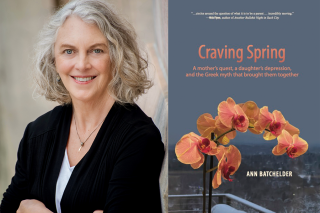Alumna Ann Batchelder is the author of Craving Spring: A mother’s quest, a daughter’s depression, and the Greek myth that brought them together (Legacy Book Press, forthcoming 2023). In this deeply personal account, Batchelder identifies with the Greek goddess Demeter as she helps her daughter recover from addiction and supports her on the road to recovery.
“My memoir is the story of my desperate attempt to rescue my daughter from depression and addiction, and how a Greek myth helped me transition from mothering a troubled teen to guiding a resilient young adult,” says Ann Batchelder ’79MSW. To be published this October, Craving Spring: A mother’s quest, a daughter’s depression, and the Greek myth that brought them together explores women’s wisdom and the complex beauty of mother-daughter relationships. “Ultimately, the book shows how stories can help heal us, expand our expectations, and guide us to rescue ourselves.”
Throughout her teen years, Batchelder's daughter suffered from depression, anxiety, an eating disorder, and drug addiction. Although Batchelder studied social work in graduate school, she was not prepared to handle mental health challenges so close to home. While Batchelder initially blamed herself for her daughter’s condition, she realized that by writing about her experience, she could help advance the de-stigmatization of mental illness. Her daughter not only granted Batchelder permission to publish the book, she also wrote the epilogue.
“Young people in our country are facing a major mental health crisis today, but there is little focus on the isolation, fear, and blame experienced by their families,” says Batchelder. “The worst thing for anyone facing mental illness is to feel alone, and shame prevents people from getting the help they need. My hope is that my memoir will offer understanding and compassion by showing how we are all on the spectrum of addiction on some level.”
Beyond dismantling stigmas, Craving Spring also addresses common misconceptions about addiction. The book discusses genetic links and the altering of neural pathways that work to support addictive behaviors. “Treating addiction is not just about eliminating substances,” Batchelder says. “You have to continue to reprogram your thinking and change how you overcome stressful situations. This is a lifelong process.”
When Batchelder was trying to cope with the situation, she found a meaningful connection in the ancient Greek myth of Demeter, goddess of the harvest and agriculture, and her daughter Persephone, goddess of spring.
According to the myth, Persephone is captured and dragged to the underworld. Demeter is so overcome by fear and anguish that she neglects her divine duties. As a result, crops fail to grow and mortals begin to starve, but Demeter’s sole concern is rescuing her child. “I could relate,” says Batchelder. “When my daughter was captured by depression and self-destructive behavior, I was lost, confused, and terrified. I wondered how Demeter would have handled this.” Craving Spring has a fluid chronology and intersperses Greek mythology with chapters from Batchelder’s own life story. “As I studied Demeter, she became the blueprint I needed for my own transition from one stage of motherhood to the next,” reflects Batchelder. “The myth gave me permission to advocate for my daughter when she couldn’t care for herself and taught me how to let go once she became stronger. Plus, Demeter embodied something my generation was missing — she wasn’t trying to be a perfect mom."
Batchelder’s deep interest in mental health and wellness led her to pursue her master’s degree at Simmons’ School of Social Work where she interned at Cambridge Hospital's psychiatric outpatient unit, ran a woman's therapy group at the Cambridge Court clinic, and worked with community mental health programs. “Attending Simmons in the 1970s was an exciting time because everything was being challenged,” Batchelder says. “One of my professors was Sophie Freud, Sigmund Freud’s granddaughter. She was quite a feminist and we got into lively debates in her class about women’s identity.”
Batchelder’s interest in spirituality and the visual arts shaped her approach to holistic healing and writing. Although she does not subscribe to any one religious tradition, she finds herself drawn to Buddhist philosophy. Batchelder studied mindfulness for 10 years under the leadership of a Buddhist teacher in Asheville, North Carolina. “Learning to practice staying calm in the midst of emotional turmoil taught me how to navigate through my daughter's depression and addiction,” she says. “My experience as an art magazine editor and later museum curator taught me how to combine creativity and communication, which informed my writing.”
Ultimately, Craving Spring demonstrates the power of stories for humanity. “Traditionally, stories are how human beings understand life. They offer guidance and healing,” she says. “I think this is why memoirs and novels are so important to people who are going through personal struggles. Moreover, readers don’t want to see a cookie-cutter book on how to be perfect. They want to see someone who has been through similar obstacles and has overcome them. Stories are incredibly important and central to our mental wellbeing.”
Batchelder’s advice to Simmons students is to embrace curiosity. “Everything you do in life informs and inspires the next step, so trust that hard-earned wisdom and don’t be afraid to try something new.”
Craving Spring will be published on October 3. To pre-order a copy of the book, visit Ann Batchelder's website.

